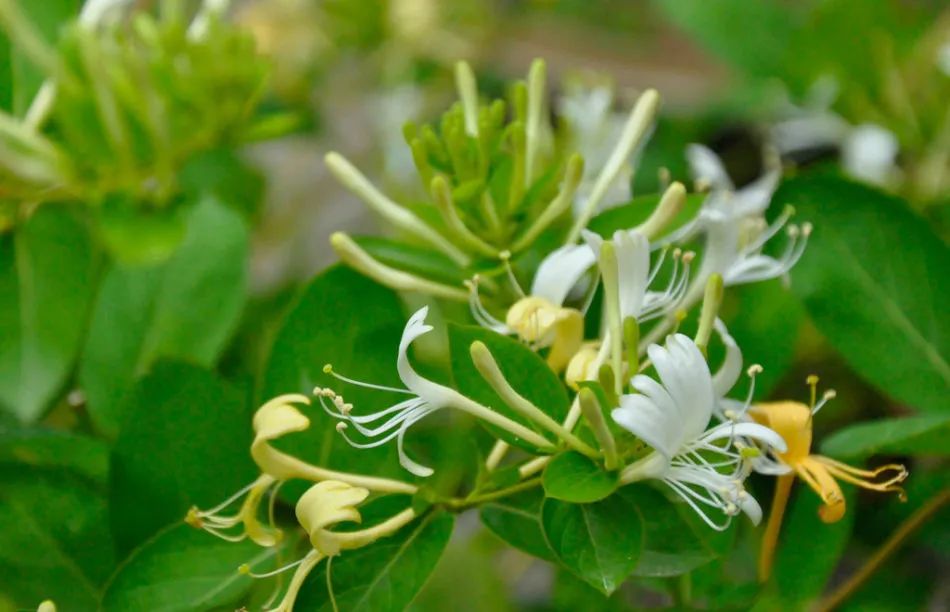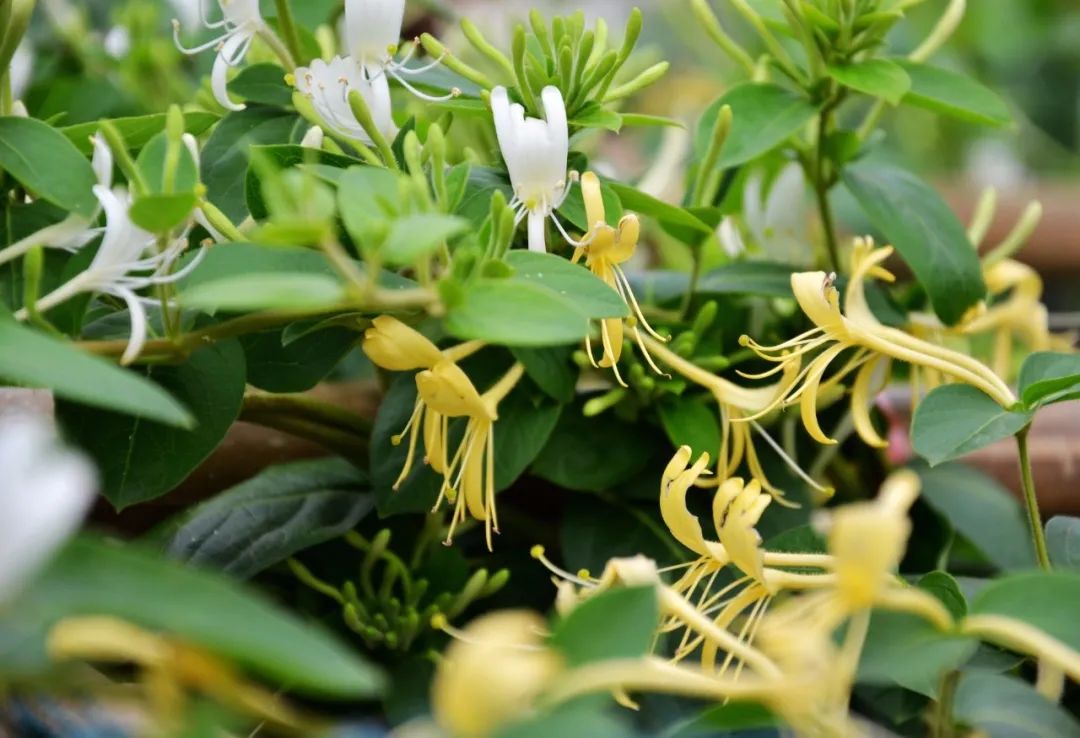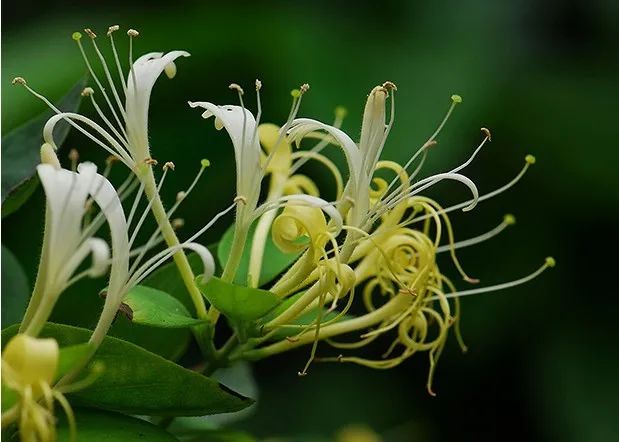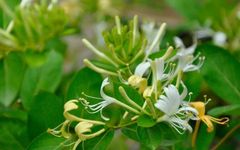Honeysuckle (Jin Yin Hua) is a particularly popular health food in daily life and is also a traditional Chinese medicinal herb known for its ability to clear heat and detoxify. It comes from the flower buds of the Lonicera japonica plant, which initially blooms white and gradually turns yellow, creating a beautiful contrast. The name “Honeysuckle” is derived from this characteristic. Both its dietary and medicinal benefits are remarkable, but there are also certain side effects and contraindications to be aware of when consuming it.

The Efficacy and Functions of Honeysuckle
1. Antibacterial and Anti-inflammatory
Honeysuckle contains various natural medicinal components, and its primary function is antibacterial and anti-inflammatory. It has a good inhibitory and eliminatory effect on Staphylococcus aureus, Streptococcus hemolyticus, Salmonella, and Pneumococcus in the human body. When combined with another herb, Lian Qiao (Forsythia), its antibacterial ability is enhanced. Additionally, when used alongside penicillin, it can help eliminate bacteria that are resistant to penicillin.
2. Prevention of Hyperlipidemia
Honeysuckle can inhibit the absorption of cholesterol in the human intestine and purify the blood, accelerating blood circulation. It can prevent elevated blood lipids and hypertension, greatly benefiting cardiovascular health. Furthermore, for individuals with atherosclerosis, regular consumption of Honeysuckle can lead to a quicker recovery. Besides these benefits, Honeysuckle can also enhance the immune system and relieve fatigue.

Medicinal Value of Honeysuckle
1. Treating Colds
Honeysuckle not only clears heat and detoxifies but also has antiviral properties and can eliminate inflammation in the body. It can inhibit the activity of the influenza virus, and regular consumption can help prevent colds. Moreover, after catching a cold, using Honeysuckle can quickly alleviate symptoms such as sore throat, cough, nasal congestion, and fever.
2. Treating Mumps
Honeysuckle has a significant therapeutic effect on mumps, which is common in humans. It can combat viruses and eliminate inflammation. When experiencing mumps, one can boil Honeysuckle with Lian Qiao and Ban Lan Gen (Isatis root) to help alleviate the swelling and pain. Additionally, for tonsillitis, Honeysuckle can be used in combination with Chrysanthemum and Licorice to help reduce inflammation and relieve throat pain.
Benefits of Consuming Honeysuckle
Regular consumption of Honeysuckle in moderation can greatly benefit health. It not only provides rich nutrients but also enhances the body’s ability to resist inflammation and viruses, clears heat, cools the blood, and detoxifies. It helps maintain the stable function of various organs, and frequent consumption can lower the incidence of various diseases.
Side Effects of Honeysuckle
Honeysuckle is rich in nutrients and has excellent medicinal effects, providing numerous benefits to the body. However, it has a cold nature, and some individuals may experience side effects after consumption, especially those with spleen and stomach disharmony or cold spleen and stomach. They may experience abdominal pain or digestive issues, and in severe cases, diarrhea, which can significantly harm digestive health. This is the most common side effect of consuming Honeysuckle.
Contraindications for Honeysuckle
Honeysuckle is a cold-natured herb, particularly suitable for those with a hot constitution or those who frequently experience heat-related issues. However, individuals with a cold spleen and stomach or cold constitution should avoid it, as it may lead to adverse reactions. Additionally, when brewing Honeysuckle tea, it should not be stored for too long, especially overnight, as it should not be consumed after that. These are important contraindications to consider when consuming Honeysuckle.
1. Do Not Overconsume Honeysuckle
Due to its cold nature, excessive consumption of Honeysuckle can easily lead to gastrointestinal discomfort and may even trigger gastric diseases or pain. This is particularly true for those who are already prone to cold conditions, especially those with gastric cold and frequent stomach pain. Such individuals should only consume Honeysuckle in moderation when experiencing heat-related issues. However, some may rush to consume large amounts of Honeysuckle to quickly reduce heat, which can be extremely harmful to the body, causing more harm than good.
2. Avoid Honeysuckle During Menstruation
During menstruation, women should take special care of themselves, avoiding cold foods and contact with cold water or objects. Since Honeysuckle clears heat and detoxifies, it is considered a cooling herb, and should not be consumed during menstruation to avoid harm to the body.
3. Individuals with Gastric Cold Should Avoid Honeysuckle
As Honeysuckle is a cooling herb, those with gastric cold should avoid it, as it may exacerbate their condition and lead to increased stomach pain, which is detrimental to health.
Honeysuckle
This product is the dried flower buds or early flowers of the Lonicera japonica plant, primarily produced in Henan and Shandong provinces. It is harvested in early summer before blooming and dried. The best quality is characterized by long, plump flower buds that are not open, yellowish-white in color, bright, fragrant, and free of leaves. It can be used raw, stir-fried, or made into a decoction.
Identification of the herb: The flower buds are rod-shaped, thicker at the top and thinner at the bottom, slightly curved, with a yellowish-white or greenish-white surface densely covered with short soft hairs. Leaf-like bracts may occasionally be seen. The calyx is green, with five lobes at the tip, and the lobes are hairy. The open flowers have a tubular shape with a two-lipped tip: there are five stamens attached to the tube wall, yellow in color; one pistil, with a hairless ovary. It has a fragrant aroma, a mild, slightly bitter taste.
Properties: Sweet, cold. It enters the Lung, Heart, and Stomach meridians.
Functions and Indications: Clears heat and detoxifies, disperses wind-heat. It is indicated for carbuncles, sore throat, erysipelas, heat-toxicity blood dysentery, wind-heat colds, and febrile diseases.
Dosage: Decoction, 6-15 grams.
Precautions: Contraindicated for those with spleen and stomach deficiency and those with qi deficiency and pus-filled sores.
Modern Pharmacology: The chlorogenic acid compounds contained in Honeysuckle have a certain inhibitory effect on various pathogenic bacteria, including Staphylococcus aureus, Streptococcus hemolyticus, Shigella, and Vibrio cholerae. It also has certain antiviral effects against influenza and Coxsackie viruses. Honeysuckle decoction and injection have varying degrees of antipyretic effects and significantly increase the phagocytic percentage and index of mouse peritoneal macrophages. Chlorogenic acid compounds also have choleretic and hepatoprotective effects. Additionally, Honeysuckle has hemostatic, cholesterol-lowering, anti-fertility, central nervous system stimulating, and gastric juice secretion-promoting effects.
Selected Formulas
1. For dysentery: 25 grams of Honeysuckle, roasted until dry. Take with white honey water for white dysentery.
2. For internal and external carbuncles: 200 grams of Honeysuckle, 150 grams of Licorice, decoct and take immediately; if drinkable, use wine for decoction.
3. For biliary tract infections and wound infections: 50 grams of Honeysuckle, 25 grams each of Lian Qiao, Da Qing Gen (Isatis root), Huang Qin (Scutellaria), and wild Chrysanthemum, decoct and take.
Dietary Therapy
Honeysuckle and Snow Pear Honey Drink: Clears heat and transforms phlegm. 3 grams of Honeysuckle, 250 grams of snow pear, 20 grams of honey. First, wash the Honeysuckle, crush it, and set aside. Then wash the snow pear, chop it with the skin, and add it to the pot with the crushed Honeysuckle. Add an appropriate amount of water and simmer for 20 minutes. Filter through clean gauze to remove the residue, collect the filtered juice in a container, and mix in honey while warm. Take twice a day or as a beverage, finishing it within the day.
Honeysuckle Tea: Clears heat and detoxifies, clears the liver and brightens the eyes. 3 grams of Honeysuckle, 8-10 goji berries, and an appropriate amount of rock sugar. Place the ingredients in boiling water and steep for 5 minutes, then drink as tea.
More Exciting Recommendations:
Chinese Herbs: The Efficacy of Perilla
Chinese Herbs: The Efficacy of Artemisia
Chinese Herbs: The Efficacy and Functions of Pinellia
Chinese Herbs: The Efficacy and Functions of Hedyotis (6 Major Benefits and Consumption Methods)
The above contentis sourced from the internet and is for reference only. Please delete if infringed!
Follow your physician’s advice! Do not self-medicate! Be the first to bookmark and share with friends,the more people see it, the more health benefits!
Be the first to bookmark and share with friends,the more people see it, the more health benefits!

